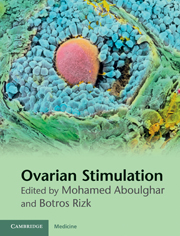Book contents
- Ovarian Stimulation
- Ovarian Stimulation
- Copyright page
- Dedication
- Contents
- Contributors
- About the editors
- Foreword
- Preface
- Section 1: Mild forms of ovarian stimulation
- Section 2: Ovarian hyperstimulation for IVF
- Section 3: Difficulties and complication of ovarian stimulation
- Section 4: Non-conventional forms used during ovarian stimulation
- Section 5: Alternatives to ovarian hyperstimulation
- Section 6: Procedures before, during, and after ovarian stimulation
- Index
Section 4: - Non-conventional forms used during ovarian stimulation
Published online by Cambridge University Press: 05 August 2011
- Ovarian Stimulation
- Ovarian Stimulation
- Copyright page
- Dedication
- Contents
- Contributors
- About the editors
- Foreword
- Preface
- Section 1: Mild forms of ovarian stimulation
- Section 2: Ovarian hyperstimulation for IVF
- Section 3: Difficulties and complication of ovarian stimulation
- Section 4: Non-conventional forms used during ovarian stimulation
- Section 5: Alternatives to ovarian hyperstimulation
- Section 6: Procedures before, during, and after ovarian stimulation
- Index
Summary
- Type
- Chapter
- Information
- Ovarian Stimulation , pp. 143 - 172Publisher: Cambridge University PressPrint publication year: 2010

